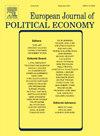政治机构和产出崩溃
IF 2.3
3区 经济学
Q2 ECONOMICS
引用次数: 0
摘要
本文探讨了在专制体制下是否更有可能出现重大产出崩溃。利用 1971-2016 年间 123 个发展中国家的数据,我们将产出增长和政治体制的共同演变模拟为一个二维状态空间的有限状态马尔科夫链。我们研究了国家如何在不同状态之间移动。我们发现,民主国家比专制国家更有可能保持增长;专制国家的产出崩溃更有可能加深;专制国家的停滞可能导致彻底崩溃。民主国家似乎更具弹性。本文章由计算机程序翻译,如有差异,请以英文原文为准。
Political institutions and output collapses
This paper examines whether major output collapses are more likely under autocracy. Using data on 123 developing countries over 1971–2016, we model the joint evolution of output growth and political institutions as a finite state Markov chain with a two-dimensional state space. We study how countries move between states. We find that growth is more likely to be sustained under democracy than under autocracy; output collapses are more likely to deepen under autocracy; and stagnation under autocracy can give way to outright collapse. Democratic countries appear to be more resilient.
求助全文
通过发布文献求助,成功后即可免费获取论文全文。
去求助
来源期刊

European Journal of Political Economy
Multiple-
CiteScore
3.40
自引率
10.00%
发文量
106
期刊介绍:
The aim of the European Journal of Political Economy is to disseminate original theoretical and empirical research on economic phenomena within a scope that encompasses collective decision making, political behavior, and the role of institutions. Contributions are invited from the international community of researchers. Manuscripts must be published in English. Starting 2008, the European Journal of Political Economy is indexed in the Social Sciences Citation Index published by Thomson Scientific (formerly ISI).
 求助内容:
求助内容: 应助结果提醒方式:
应助结果提醒方式:


